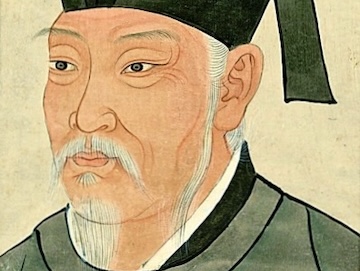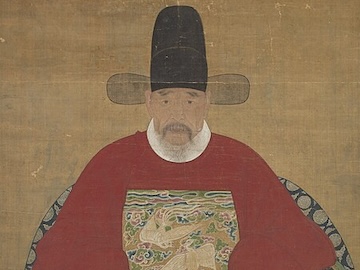1 November 19 Tuesday
I recently added this post, Three Poems of Po Chu-i. It is a small sample of the work of Po Chu-i (772-846), one of China’s most enduringly popular poets.
The first of the three extracts collected in this post appeared in NL Clay’s Advanced English Exercises (1939), in a section on the validity of arguments.
“THOSE who speak know nothing;
Those who know are silent.”
These words, as I am told,
Were spoken by Lao-tzu.
If we are to believe that Lao-tzu
Was himself one who knew,
How comes it that he wrote a book
Of five thousand words?
It would also have deserved a place among Clay’s exercises in reading aloud.
Po Chu-i was known (and at times scolded) for the natural simplicity of his verse, but it was that very quality that helped his work to endure. All three poems in this post are simple and direct, yet full of thought-provoking reflection.
2 November 18 Monday
I recently added this post, The Oath of Harold Godwinson. It is taken from Henrietta Marshall’s History of France published in 1912.
Harold Godwinson was the son of Earl Godwin, who before his death in 1053 had been a mighty nobleman in the court of King Edward the Confessor (r. 1042-1066). In 1063, Harold slipped across the Channel to Normandy, where he was welcomed by the young Duke of Normandy, William, Edward’s cousin once removed: William’s grandfather, Duke Richard II, was the brother of Emma of Normandy, Edward the Confessor’s mother. William believed this family relationship gave him a solid claim to the throne of England, as Edward had no child of his own; but it would undoubtedly benefit from the support of Earl Godwin’s son. So William backed Harold into a corner, and extracted a solemn and unbreakable promise to help make William, and only William, King of England.
At any rate, that was what William’s people said had happened, after Edward died early in 1066, and Harold claimed the English crown. William came to remind him about it the following October. Whether the story is true, and whether, if it is true, William’s methods were quite fair, are another matter altogether.
3 November 17 Sunday
I recently added this post, The Dignities of God and Man.
It consists of a few brief chapters from Mengzi or ‘Master Meng’, a collection of sayings attributed to Chinese statesman and philosopher Meng Ke. He is known in the West as Mencius (?371-?289 BC), which is pronounced MEN-shee-us.
Mencius was a follower of Confucius (551-479 BC). He developed his ideas amidst the tensions and temptations of high public policy, and emphasised the importance of personal reform ahead of institutional reform: it was essential for officials to put themselves in order before they could hope to put the country in order. As Sir John Bowring put it, in a collection of proverbs he had gathered during his time in China,
“If every one would see
To his own reformation,
How very easily
You might reform a nation.”
In this passage, Mencius focuses on the virtue that our translator, Herbert Giles, a professor of Chinese at the University of Cambridge, named ‘charity of heart’ in a conscious attempt to evoke a parallel with St Paul’s moving reflection on charity in his First Epistle to the Corinthians.
For Sir John Bowring’s proverb, see also Samuel Smiles on An Unpopular Popular Reform.
4 November 15 Friday
I recently added this post, The Peasants’ Revolt, an account of the stirring events of the summer of 1381. I already had a short summary of the main events, but this is a much fuller account by a recognised Victorian-era writer, HW Dulcken, taken from his Picture History of England (1865). This book, like most of Dulcken’s work, was written for young readers, which helps to keep the passage reasonably short, and always to the point.
The Peasants’ Revolt began in the summer of 1381, when Wat the tiler from Dartford in Kent led a huge protest march to London, complaining of extortionate taxes and restrictive regulations on employees. The peasants had right on their side, and the country would have leapt forward both economically and socially had their complaints been taken to heart. But it all came to nothing, because the protestors became violent, and because the authorities backtracked on the concessions they had promised when they thought they were losing.
By the way, for those who enjoy playing with language, see if you can explain the difference between The Peasants’ Revolt and the peasants revolt.
5 November 15 Friday
I recently added this post, The Commons Versus the People.
This is a short extract from GK Chesterton’s Short History of England, first published in 1917. Chesterton looked at the Peasants’ Revolt in 1381, when Wat the tiler from Dartford in Kent led a huge protest march to London, complaining of extortionate taxes and restrictive regulations on employees.
Chesterton spent little time on the revolt itself. His focus was on the role of Parliament and the commons (ordinary people) who attended it as representatives of the public. This was a relatively new feature of English government, introduced because the King realised he had to have some kind of popular consent for his taxes. Yet on this occasion, said Chesterton, faced with a popular revolt against a demonstrably unfair tax, what did the Commons do? They acted not in the interests of the people at large, but in their own interests, and a new social class was revealed: the Governing Class.
6 November 13
I have re-published an older post from the Copy Book, Jack Cade’s Revolt, which is an account of a rebellion against King Herny VI led by Irishman John Cade in the summer of 1450. Originally, this was a short summary piece I wrote myself; now it is a three-part tale from the pen of Charles Dickens, in his Child’s History of England.
Many years before Jack Cade, in 1381, a man called Wat Tyler had led just such a protest against the young King Richard II. Dickens has a good deal of sympathy for Tyler, but not for Cade, an adventurer whose susceptibility to temptation helped the Government to seize the advantage.





